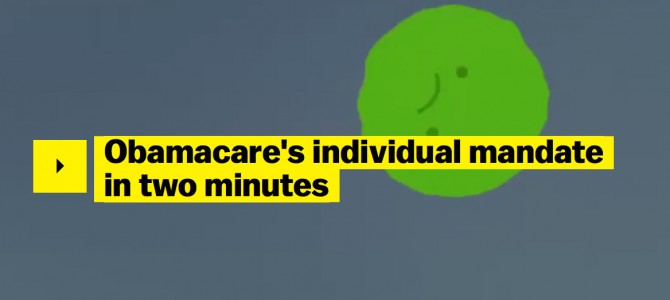
Ezra Klein recently released a 2-minute clip explaining the need for individual mandates under Obamacare. Man, does that guy talk fast!
Mr. Klein gets most of his explanation about right, with one big exception. He says that a family making $80,000 a year will (eventually) be penalized $2,000 for failing to buy coverage — “less money than health insurance will usually cost you, but you don’t get anything for that money,” he says. Uh, that’s understating things quite a bit. A family insurance policy costs $16,351 according to the most recent employer benefits survey from the Kaiser Family Foundation.
So, right off the bat Mr. Klein’s explanation fails. He is asserting that of course the mandate will be effective since people will have to pay more or less the same whether they’re insured or not, so they might as well get covered and get some value for the money.
That might be true except for two things. A family that does not get covered will save $14,351 to use for other things. That is a whole lot of money for most people. Plus, even the $2,000 penalty will be impossible to collect. It can be collected only through seizing a family’s tax refund. It is easy enough to avoid having a refund if the family adjusts its withholding at the start of the year so it doesn’t overpay its taxes.
But Mr. Klein is correct that it is impossible to have community rating and guaranteed issue in a voluntary market. We have seen how that works in New Jersey, New York and several other states that have tried it. It is a disaster.
In theory this sort of policy can work only if people are required to buy coverage. Otherwise healthier people will wait until they are sick to get covered, leaving only the sicker people in the pool and raising costs even more. This is the famous “death spiral” everybody talks about.
But the analysis can’t just stop there. (This is a common problem with Progressives. They fail to ask the “then what?” questions). Once a mandate goes into effect, what happens then?
First, as we indicated above mandates are impossible to enforce. It isn’t just in health insurance. Auto insurance is mandated in almost every state, but the rate of non-compliance is about 14 percent nationally and in many states the rate of non-insurance for auto (which is mandated) is even higher than for health (which is not). Similarly, with other mandates — child support, helmet laws, seat belt laws, even taxes. Non-compliance is always about 15 percent, even when there are severe penalties such as jail time for violation.
Second, requiring healthy people to buy and pay the same as sick people for coverage simply isn’t fair. As Mr. Klein himself says in his video, sick people value coverage more than healthy people do and are willing to pay more for it. They do not feel they are disadvantaged by paying more, they are happy to have it. Sure, we would all like to pay less for the things we want, but very few of us want to pay more for things we do not value.
Third, a mandated, community-rated system will fail to deliver the right services to the right people. Private insurers will be highly incentivized to load up on the benefits that attract the healthy people (preventive care, birth control pills) and skimp on benefits for the very expensive people (like cancer treatment). And it isn’t just private insurers that have these incentives. Public programs do, too. There are a whole lot more healthy voters than sick ones, so maintaining political support means providing more benefits to the healthy.
We already see this in Obamacare, with oodles of requirements to cover preventive services but very thin networks for cardiac care or cancer centers. It isn’t much value to the sick people to pay the same as healthy people if they can’t get the services they need. They would much rather pay more and actually get treated for their condition — but that isn’t an option under Obamacare.
Mr. Klein wraps up his argument by saying that it worked in Massachusetts. Maybe, but Massachusetts is not like anywhere else in the United States. Health care costs there are 36% higher than the national average, and that state had only 9.5 percent of its population uninsured before the mandate went into effect. Now it has come down to about 5 percent. Many of the previously uninsured likely hopped across the borders to Connecticut and New Hampshire (just an hour’s drive from Boston). Plus, the waiting times to see a doctor in Boston is about double that of any other major city in the United States (see here).
California, to take one big example, is nothing at all like that. California has 21% uninsured and half the number of doctors as Massachusetts. And it has no nearby New Hampshire to receive those people who choose to remain uninsured.
Finally, Mr. Klein’s arguments are being undermined by the Obama Administration’s daily decisions to delay the effects of this law. They don’t want to face the political heat of actually enforcing it on people — something Mr. Klein doesn’t have to worry about.









